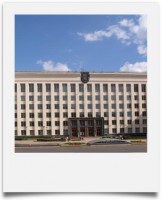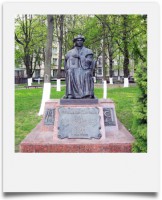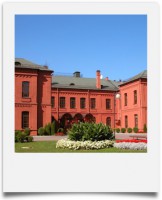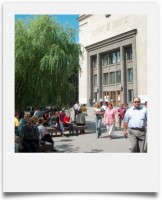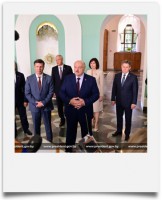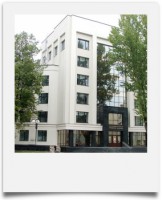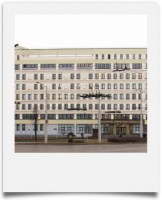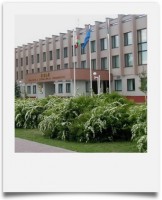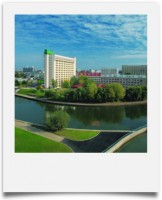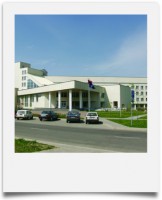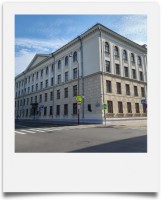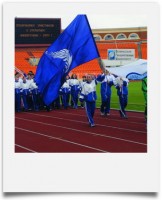Belarusian State University
What we should impart on our students is not a fixed body of knowledge, but an ability to realise what they do not know. Instead of teaching students how to read a book, we should be teaching them to read between the lines. Rather than teaching students to give pre-determined answers, we should be teaching them how to ask questions, and how to make personal discoveries about themselves.
Andrei D. Karol
Rector
The first national university in Belarus was opened on October 30, 1921. The historian and slavist Vladimir Picheta became its first rector. On October 31, 1921, the first lecture was delivered under the roof of the Belarusian State University. Regular classes began at its three faculties - Workers, Medicine, and Social Sciences.
During the Great Patriotic War, the University staff and students fought the enemy at the fronts and in partisan detachments. Twelve BSU students and teachers were awarded the title of the Hero of the Soviet Union.
On May 15, 1943, the Council of People"s Commissars of the USSR adopted a resolution On the resumption of work of the Belarusian State University. The new location of BSU was the Skhodnya station of the Oktyabrskaya Railway, near Moscow. The main academic building was housed in the local school.
After the end of military operations, the Belarusian State University relocated back to the capital of the republic, Minsk. On October 16, 1944, lectures resumed. In December, the new University structure was approved: administration, academic, personnel, and accounting departments, library, office of the registrar, dormitory, special department, deans’ offices. In addition to the History, Chemistry, Biology and Geography faculties working in evacuation, BSU opened Part-Time Faculty and the Faculty in Journalism.
After Belarus gained independence in 1991, the Belarusian State University was officially recognized as the leading higher education institution in the new country. With the government’s support, since the late 1990s BSU has strengthened its resource base, renovated its fixed assets, restructured its educational and research system, and created a developed infrastructure.
The University gave birth to a number of independent specialized institutions in Belarus (Belarusian State Medical University, Belarusian State Economic University, Belarusian National Technical University, among others).
Today, BSU maintains its position as a leading higher education institution in Belarus, which honours its foundations and traditions.
For more information on BSU history, please visit https://time.bsu.by/ru/
BSU Anthem and Statute
The Belarusian State University is the national leader in higher education that operates on the basis of the Constitution of the Republic of Belarus, the Statute, as well as other statutory and regulatory acts.
The subject and objectives of the university activities, sources of financing and control tools over the activities of the Belarusian State University are set out in the Belarusian State University Statute, along with the general provisions. Separate chapters are devoted to the university structure, BSU management, the university staff and students, BSU international activities, the procedure for its liquidation and reorganization.
According to the Statue, BSU performs educational, intellectual, cultural and social functions aimed at satisfying the needs and interests of the individual, society and the state.
The BSU core is a union made up of students, cadets, postgraduate students, doctoral students, academic staff, other pedagogical and research employees who carry out their activities in accordance with the classical traditions of university education based on:
- the principles of freedom of academic teaching,
- research and dissemination of knowledge,
- the unity of study and research,
- the link between science and education, and practice,
- social responsibility,
- a combination of centralized government with democratic self-governance.
Executive Order of the President of the Republic of Belarus of June 16, 1999 N 334 ‘Statute of the Belarusian State University’
The Belarusian State University has its own anthem written by Igor Luchenok and Sergey Beltyukov (music), Leonid Dranko-Maisyuk (lyrics)
BSU Complex
The entire complex of the Belarusian State University includes 16 faculties and 6 educational institutes, 10 educational establishments, 10 research and development institutes and centers, 41 research and developments laboratories, 10 innovation and production enterprises. The entire complex of the BSU includes about 8500 staff including about 3000 teaching staff and 500 research staff.
BSU in international rankings
According to the most respected international rating agencies, BSU is in the 1 % of the best universities in the world.
One of the strategic priorities for BSU is to participate in international rankings. This allows the University to become a full-fledged member of the international educational community, while bringing academic and scientific research processes into accordance with international rules and standards in the field of education.
Out of the 30,000 universities around the world, BSU ranks steadily among the top 1 % universities according to the QS World University Rankings, the Best Global University, U.S. News, etc. Since 2017, BSU has been the Belarus' only university in Shanghai Academic Ranking of World Universities (ARWU) by academic subjects. It ranks 201–300 in Physics. BSU e-library is among the world's top 50 open access repositories according to the Transparent Ranking of Repositories.
In general, BSU regularly participates in 11 global and 7 subject rankings of 12 international agencies, including the Big Three (QS, THE, and ARWU), as well as other mass universities rankings.
For more information, please visit https://bsu.by/en/rankings/
History
 On February 25, 1919, the Central Executive Committee of the Byelorussian SSR resolved to establish the first national university in Belarus. However, the occupation of Minsk by the Polish army delayed these plans, and the university was actually opened on October 30, 1921. The historian and slavist Vladimir Picheta became its first rector.
On February 25, 1919, the Central Executive Committee of the Byelorussian SSR resolved to establish the first national university in Belarus. However, the occupation of Minsk by the Polish army delayed these plans, and the university was actually opened on October 30, 1921. The historian and slavist Vladimir Picheta became its first rector.
After Belarus gained independence from the USSR in 1991, Belarusian State University was officially recognized as the leading establishment of higher education in the new nation. New faculties and institutes were created: the Faculty of International Relations (1995), the State Institute of Management and Social Technologies (2003), the Military Faculty (2003), the St. Methodius and Cyril Theological Institute (2004), the Humanities Faculty (2004); the Institute of Business and Technology Management (2006), the Confucius Institute for Sinology (2007). In 2008 the Faculty of Journalism was reorganized into the Institute of Journalism. The university also established university preparation and continuous education centers. Several new research centers were founded as well: the Centers for Particle and High Energy Physics (1993), Ozonosphere Monitoring (1997), Applied Problems in Mathematics and Computer Science (2000), and Human Problems (2000). New buildings were constructed for the Faculties of Biology, Philosophy and Social Sciences, and International Relations, the Institute of Journalism, and the university television center.
BSU Academic Community

The total number of academic staff at the Belarusian State University is 3,800, including 8 academicians and 130 corresponding members of the National Academy of Sciences of Belarus, 400 Doctors of Science and over 1,400 Candidates of Science. About 28,500 undergraduate, postgraduate and doctoral students study here.
BSU offers 79 undergraduate programmes and more than 46 Master's programmes. BSU postgraduate courses leading to a Candidate of Science degree cover 132 subject fields. In the last 3 years alone, 19 new specialties and 37 new study fields have been introduced at BSU.
According to statistics:
every sixth Candidate and every fifth Doctoral theses in Belarus are prepared at BSU;
every fifth graduate student, every fourth foreign graduate student, and every third student of Belarus included in the Republican Youth Bank study at the Belarusian State University.
Science
BSU is a big scientific, research and industrial centre, the potential of which is developed by
- 6 research institutions and centres
- 5 innovation enterprises
- 2 innovation centres with Belarusian and foreign participation;
- 11 unitary enterprises
- over 40 research laboratories
- about 1,000 researchers and highly-qualified professionals.
More than a third of BSU students take an active part in the University research activity.
Exports of the BSU knowledge-intensive products exceed $2 million per year.
Annually BSU hosts about 100 science and research events (conferences, seminars, etc.)
Over 1,000 scientific publications and over 5,000 academic articles are released by the University every year.
BSU can rightly take pride in its researchers' achievements:
- as part of the CMS and ATLAS collaborations, a set of works was carried out to analyse the data obtained in experiments at the Large Hadron Collider (15 BSU physicists co-authored publications on the discovery of the Higgs boson).
- heat-resistant materials with operating temperatures up to 1,700°C, developed at BSU, are used in nuclear energy, space and aviation industries.
- more than 20 technologies for producing galvanic and chemically deposited coatings from solutions were developed at BSU and mastered by enterprises in Belarus and abroad.
- over 150 world-standard research-intensive technological equipment systems have been developed and manufactured at BSU. About 40 million filters and more than 120,000 linear metres of thermal insulation are produced here annually.
- unique veterinary biologics were created at BSU, in particular, biologics for plant protection, as well as a new generation of disinfectants. The biologics have been put into production.
- since the 1990s BSU has been taking part in space research on the International space station (ISS). Since 2014 a video spectral system created by BSU researchers has been working aboard a Russian segment of the ISS.
- 280 highly efficient powerful power sources were manufactured at BSU for enterprises of the Federal Space Agency of Russia (Roscosmos).
- over 3,000 operations were performed using Cisplacel, a cancer drug, manufactured by Unitehprom BSU.
- more than 250 sessions for treating internal organ cancers were performed using PTICH-M, hyperthermal computerized equipment , developed at BSU.
- The Belarusian State University is the developer and the Belarus' only manufacturer of pheromone preparations for forest pest control. More than 100,000 dispensers for pheromones were produced, which made it possible to preserve and increase the country's forest fund.
- up to a 40% increase in the yield of vegetable crops is ensured by the use of biopesticides developed at the University for the protection and regulation of plant growth.
Today, BSU researchers' articles are the most cited in Scopus and Web of Science databases among other Belarusian scientists.
The university has a developed system of incentives for defending theses. The Rector's Regulations on Grants appropriate up to 5 grants for doctoral theses and up to 3 grants for candidates of science theses.
BSU encourages the development of youth science and regularly carries out a research paper competition among doctoral students, postgraduate students and students, the competition Best BSU Student Research Laboratory , as well as a variety of conferences, symposiums, seminars, projects, archaeological excavations.
International cooperation
 Today our university has over 400 international agreements signed with universities and scientific institutes out of more than 50 countries of the world and that makes the BSU country's leader in this field. Among the BSU partners are the leading European HEI's, such as Bochum, Jena, Oldenburg, Leipzig universities in Germany, university of Toulouse and Savoy in France, universities of Padua, Trento, Perugia in Italy, Barcelona, Granada and Malaga universities in Spain, universities of Warsaw, Wroclaw and Krakow in Po-land, Charles and Karlow universities in Czech Republic, Vilnius and Latvian universities in the Baltic states, and many others.
Today our university has over 400 international agreements signed with universities and scientific institutes out of more than 50 countries of the world and that makes the BSU country's leader in this field. Among the BSU partners are the leading European HEI's, such as Bochum, Jena, Oldenburg, Leipzig universities in Germany, university of Toulouse and Savoy in France, universities of Padua, Trento, Perugia in Italy, Barcelona, Granada and Malaga universities in Spain, universities of Warsaw, Wroclaw and Krakow in Po-land, Charles and Karlow universities in Czech Republic, Vilnius and Latvian universities in the Baltic states, and many others.
Relationships with scientific and education establishments of the countries of South-Eastern Asia appear to be strategic. Today the BSU cooperates with 20 HEI's of China, among them Chinese University of International Relations, Beijing University, Shanghai University, leading universities of Heyludzyan province, Harbin Polytechnic University and Harbin University of Science and Technology. Our university is proud to host the Confucius Institute, Chinese partner in this matter is Dalian Polytechnic University.
Bilateral cooperation includes different forms of joint activities:
• exchanges of Undergraduate, Master and PhD students for studies and research training
• teaching, administrative and research staff exchanges
• joint Master and PhD programs
• joint research projects, conferences and seminars
• exchange of scientific, methodical literature, and periodical editions
• sharing experience and best practices in the sphere of university management;
• cooperation in the sphere of R&D products
Belarusian State University belongs to a highly internationalized university community and puts a great attention to cooperation with foreign partners both at inter-university level and within international projects framework. 25-30 international projects focused on academic exchanges, modernization of university management, design of joint study programmes, development of infrastructure, organization of conferences, seminars and other events within such programmes as Tempus, Erasmus Mundus, Jean Monnet, EU Cross-Border Cooperation, DAAD, FPB-Belarus, SIDA, VISBY, Baltic University, CIMO, Visegrad Fund, CEI Fund, Eurasia, UNICEF, UNESCO and many others are implemented at BSU annually. Currently BSU is successfully involved into 9 Tempus and 6 Erasmus Mundus projects addressing academic mobility (EMA 2), curricular development (ACES, NETCENG, TRADIR, Сomolte, ENERGY), human security (HUMAN), promotion of innovations (SUCSID), university management (INURE) and internationalization (PICASA).
The BSU is the largest international cooperation center in field of education and science in the country. A number of centers work under the university, among them:
• Informational Center of European Union
• Informational Point of European Union
• Center on UN Studies
• Center for International Studies
• Center of Academic Mobility, etc.
For more information, please visit https://ums.bsu.by/en/international-partnership
Academic mobility
Academic mobility takes particular importance in the modern world today and is the main component of the inter-university cooperation. More than 1500 teachers, young scientists, undergraduates, master students and postgraduate students of the Belarusian State University travel abroad every year to undergo scientific training, deliver lectures, participate in conferences, as well as to do research and make joint international projects.
Most visiting countries are represented by the world's and regional leaders in economical and cultural development. International Programs and Project Office helps students and staff to apply for international scholarships and grants in order to fund their study and research visits abroad. The information is provided by means of e-mailings, information meetings and presentations, as well as individual counselling.
Most part of outgoing academic mobility is funded by European and international programs, such as Erasmus Mundus, Visby, DAAD, GFPS, Marie Curie International Incoming Fellowships, International Visegrad Fund, Huygens Scholarship Programme, Lithuanian Scholarships, Gerda-Henkel Scholarships, Polish Governmental Scholarships and many others.
More information for Russian speaking students you can see here https://ums.bsu.by/en/
Facilities
 All university study buildings are equipped with well-furnished classrooms, seminar rooms and reading lounges. There are 70 computer laboratories and 4 media classrooms.
All university study buildings are equipped with well-furnished classrooms, seminar rooms and reading lounges. There are 70 computer laboratories and 4 media classrooms.
Information Resources of the University Network include web-server, web-servers of the faculties and subdivisions of the BSU and Intranet-Server of BSU. Students are thought on the basis of with the best methods and the latest technologies of knowledge acquisition with use of distant training technologies, such as eUniversity, Moodle and eLearning systems. Computer-Aided Network Information System «University» enables effective administrative procedures for staff and students through electronic registration and issue of the personal documents. The BSU Lyceum uses the distant training system for publishing electronic training materials on the Internet. International students who study Russian as a Foreign Language at the Faculty of Pre-University Education are able to use a specially designed electronic software “Study Russian”.
In February 2010, Supercomputer SKIF was mounted in the BSU. It allows running tasks simultaneously on the 288 CPUs. It is one of the centers of the national scientific and educational GRID-network. Access to the Supercomputer resources within the university network is granted to the faculty members, scientific collaborators, undergraduates, Master and doctoral students.
University 3.0
BSU is successfully implementing B.R. Clark’s University 3.0 concept, encouraging cooperation between faculties, research institutes and enterprises. Such practice-oriented forms of training and complex research-intensive profiles are implemented in the research, educational and industrial clusters (chemistry, biology, mathematics and applied informatics, radiophysics, nuclear and radiation physics ).
This results in joint research, production of high tech goods, and training of highly qualified scientists and practitioners. BSU takes part in the innovative and industrial cluster Micro-, Opto- and Microwave Electronics , the innovative cluster in the field of journalism and mass communications Mediana , the innovative media cluster of local information space, the innovative culture-focus media, and others. UE Unitehprom BSU, a research and technology park was created at the University. Its research results are put into production and exported. BSU takes part in scientific mega-projects in various fields. The University develops new forms of industry cooperation by opening specialized laboratories at BSU divisions.
On October 29, 2018 the University put its own nanosatellite BSUSat-1 into Earth’s orbit from the Jiuquan cosmodrome (China). The satellite launch was the result of the successful ten-year work of BSU Aerospace Education Centre, Faculty of Radiophysics and Computer Technology, and Physics Faculty. The project’s aims are near-Earth radiation monitoring, analysis of the effects of space environment on the spacecraft equipment, and algorithm research for controlling the active stabilization of the satellite.
Notable alumni
In 2015 the Nobel Prize in Literature was awarded to the graduate of the Belarusian State University Svetlana Alexievich. Svetlana Alexievich graduated from the Faculty of Journalism of the Belarusian State University in 1972. Her diploma thesis was devoted to Literary Criticism in the "Neman" journal. According to the press release of the Swedish Academy, the prize has been awarded to the Belarusian writer "for her polyphonic writings, a monument to suffering and courage in our time."
Among other notable alumni of the Belarusian State University there are ministers, prominent scientists and educationalists, political leaders working in many countries of the world.
Head of the Institution:
Andrei D. Karol, Rector, Doctor of Education, Professor
Name of Institution: Belarusian State University
Foundation Date: 1921
Mailing Address: Belarus, Minsk, 220030, 4 Nezaliezhnasti av.
Phone number(s): +375 17 209-53-51, +375 17 209 53-95
Web-sites:
http://www.bsu.by
https://abiturient.bsu.by/
https://abiturient.bsu.by/info-eng.html
https://ums.bsu.by/ru/for-applicants
https://www.facebook.com/ums.bsu
E-mail: apply [at] bsu [dot] by
BSU Faculties
Faculty of Applied Mathematics and Computer Science
Faculty of Biology
Faculty of Chemistry
Faculty of Economics
Faculty of Geography and Geoinformatics
Faculty of History
Faculty of International relations
Faculty of Journalism
Faculty of Law
Faculty of Social and Cultural Communications
Faculty of Mathematics and Mechanics
Faculty of Philology
Faculty of Philosophy and Social Studies
Faculty of Physics
Faculty of Pre-University Education
Faculty of Radiophysics and Computer Technologies
Military Faculty
Educational Institutes
Institute of Theology named after Sts. Cyril and Methodius
School of Business of BSU
International Sakharov Environmental Institute of Belarusian State University
Institutes of Advanced Training
Republican Institute of Higher Education
Institute of retraining and advanced training of personnel of offices of public prosecutor, courts and establishments of Justice
Institute of informational technologies and administration
Republican Confucius Institute of BSU
Other Educational Establishments
BSU Lyceum
BSU Law Colledge
Specialties for which you can get an education
Bachelor’s Degree
• Faculty of Biology
o Biology (Scientific and Pedagogical Activities)
o Biology (Scientific and Production Activities)
o Biology (Biotechnology)
o Biochemistry;
o Bioecology;
o Microbiology.
• Faculty of Geography and Geoinformation Systems
o Geography (Scientific Pedagogical Activity, Geodemography)
o Geoinformation Systems (Land-Cadastral)
o Geology and exploration of mineral resources deposits;
o Geoecology;
o Hydrometeorology;
o Aerospace Mapping.
• Faculty of History
o Document Sciences (majors in);
o History and Archives;
o History;
o Museum studies and protection of historical and cultural heritage.
• Faculty of Mathematics and Mechanics
o Computer mathematics and systems analysis;
o Mathematics (Research Activities and Production)
o Mathematics (Economic Activities)
o Mathematics (Research and Pedagogical Activities)
o Mathematics (Research and Design Activities)
o Mathematics and Information Technologies (Web development and Internet Technologies
o Mathematics and Information Technologies (Mathematical and Software of Mobile Devices
o Mechanics and Mathematic Modelling
• Faculty of International Relations
o LANGUAGE AND COUNTRY STUDIES;
o International law;
o International Relations;
o Management (International Tourism Management);
o World Economy;
o Custom Regulations and Procedures
• Faculty of Applied Mathematics and Computer Science
o Actuarial Mathematics;
o Informatics;
o Computer Security (Mathematical Methods and Program Systems);
o Applied mathematics (Scientific and Production Activity);
o Applied Informatics (Computer Systems Software);
o Economic cybernetics (Mathematical Methods and Computer Simulation in the Economy).
• Faculty of Radiophysics and Computer Technologies
o Aerospace radio Electronics and Information Systems and Technologies;
o Computer Security (Radio Physical Methods and Program-Technical Means);
o Applied Informatics (Information Technologies of Telecommunication Systems);
o Radio Physics;
o Physical Electronics
• Faculty of Social and Cultural Communications
o Design (Object and Space)
o Design (Communication);
o Culturology;
o Applied Informatics (Web Programming and Computer Design);
o Modern Foreign Languages (Teaching)
o Modern Foreign Languages (Translation).
• Faculty of Philosophy and Social Studies
o Psychology;
o Social work;
o Sociology;
o Philosophy;
o Social Communication.
• Faculty of Physics
o Physics (Scientific Research),
o Physics (Scientific and Production Activities);
o Computer Physics
o Physics of Nanomaterials and Nanotechnologies .
• Faculty of Philology
o Belarusian Philology;
o Oriental Philology;
o Romance and Germanic Philology;
o Russian Philology;
o Slavic Philology.
• Faculty of Journalism
o Journalism (Printed Mass Media)
o Journalism (Audiovisual Journalism)
o Journalism (Web Journalism);
o International Journalism;
o Information and Communication;
o Literary Work.
• Faculty of Chemistry
o Fundamental Chemistry;
o Chemistry (Scientific Production Activity)
o Chemistry (Scientific Pedagogical Activity)
o Chemistry (Pharmaceutical Activity)
o Chemistry (Environmental Protection)
o Chemistry of Medication Compounds;
o High-Energy Chemistry.
• Faculty of Economics
o Management (International, Innovative);
o Finance and Credit;
o Economy;
o Economic Informatics;
o Economics
• Faculty of Law
o Political Science (political-legal work);
o Jurisprudence;
o Economic Law.
International Sakharov Environmental Institute of Belarusian State University
o Biomedical Science;
o Medical Ecology .
o Information Systems and Technologies (in Environment Sphere)
o Information Systems and Technologies (in Public Health)
o Environmental Protection Activities (eco-management and expertize)
o Environmental Protection Activities (environmental monitoring);
o Energy Efficient Technologies and Power Engineering Management,
o Nuclear Security and Radiation Safety.
School of Business of BSU
• Business Administration
• Logistics
• Information Resource Management;
• Marketing;
• Management (majors in)
• Major in 1-26 02 02-01 Management (Financial and Investing)
• 1-26 02 02-02 Management (Social and Administrative)
• 1-26 02 02-04 Management (Real Estate Management)
• 1-26 02 02-08 Management (Innovative Management)
Institute of Theology named after Sts. Cyril and Methodius
• Theology
Bachelor’s Degree
Training is conducted in English
• Business Administration
• Marketing
Master’s Degree
• Faculty of Biology
o Biology
o Biochemistry;
o Microbiology.
• Faculty of Geography and Geoinformation Systems
o Geography
o Geology
o Ecology;
• Faculty of History
o Document Science and Archival Science;
o History;
o Archaeology
o Museum studies and protection of historical and cultural heritage.
• Faculty of Mathematics and Mechanics
o Mathematics and Computer Science
o Mechanics and Mathematic Modelling
• Faculty of International Relations
o Oriental Studies;
o International Law;
o International Relations;
o Management
o World Economy;
o Social and Economic Systems Management
• Faculty of Applied Mathematics and Computer Science
o Applied Mathematics and Informatics;
• Faculty of Radiophysics and Computer Technologies
o Applied Physics;
o Radio Physics;
• Faculty of Social and Cultural Communications
o Design;
o Culturology;
o Art Studies.
• Faculty of Philosophy and Social Studies
o Psychology;
o Sociology;
o Philosophy;
o Communication.
• Faculty of Physics
o Applied Physics;
o Physics.
• Faculty of Philology
o Theory and Methodology of Teaching and Education (by Fields of Studies);
o Study of Literature;
o Linguistics.
• Faculty of Journalism
o Journalism
o Communication;
• Faculty of Chemistry
o Chemistry;
o Nature Protection Activities.
• Faculty of Economics
o Management;
o Finance, Taxation and Credit;
o Economy;
• Faculty of Law
o Political science;
o Jurisprudence;
• Department of Pedagogics
o Scientific and Pedagogical Activity.
International Sakharov Environmental Institute of Belarusian State University
o Biomedical Science;
o Ecology .
o Medical Physics
School of Business of BSU
• Jurisprudence;
• Business Administration
• Logistics
• Marketing;
• Management
• Social and Economic Systems Management
• Finance, Taxation and Credit;
• Applied Mathematics and Informatics;
• Public Administration and Economy
Institute of Theology named after Sts. Cyril and Methodius
• Theology
Master’s Degree
Training is conducted in English
• International Relations;
• Business Administration
• Marketing;
• Medical Physics
• Chemistry for Drug Substances
• Applied Mathematics and Informatics (Applied Computer Data Analysis: Logistics Analytics)
• Political Science (Public Policy)
• History;
• Communication
• Study of Literature;
• Geography
• Applied Physics;
• Biology
• Mathematics and Computer Science
• Mechanics and Mathematic Modelling
• Biomedical Sciences
Pre-university program preparation is aimed at preparing foreign student to applying for higher education. Studies are conducted in the Republic of Belarus state languages – Russian and Belorussian.
The form of studies is full time.
The studies are held on a fee basis.
The duration of studies I 1 academic year (10 months).
After the completion the student gets Certificate on completion of the Pre-university faculty which enables him to apply for higher education in the Republic of Belarus and in CIS countries.
The basis of studying process is learning Russian, literature and subjects of the future specialty. Studying is conducted on 5 profiles: humanitarian, economical, science, technical and medicine-biological.
Studies are conducted in the form of lectures, seminars and practical classes, presence on which is obligatory for the student in order to fulfill the curriculum.
More detailed information on terms of applying and groups completion can be found on the Web-site: www.fpuedu.bsu.by
Telephones: (+375 17) 284-00-09, (+375 17) 284-00-02, (+375 17) 284-26-82.
Courses of Russian as a Foreign Language are organized during September – June. The curriculum is based on module principle according to learners' wish: 20 hours a week within 4, 12, 18, 36 weeks (80 -720 hours) and includes the material satisfying the requirements of certificate levels of language proficiency.
Russian language courses at the BSU is available both at the Faculty of Pre-University Education (for individuals with zero level of Russian) and at the Faculty of International Relations (for idividuals with elementary level of Russian). - Web-site: www.fpuedu.bsu.by
Read more about Russian language courses at the Faculty of International Relations
Enrollment procedure for the Russian language courses at the Faculty of International Relations of Belarusian State University (BSU) includes:
A) the procedure of getting an invitation to study at the Russian language courses at the BSU includes: filling in an application form and submitting documents (the copy of passport, copy of educational documents, copy of the medical health certificate) that a candidate should send by e-mail to the address: Ananich [at] bsu [dot] by (all documents should be translated into Russian or English); consideration of the documents by the BSU; making an invitation for training (the copy of the invitation is sent to the candidate by e-mail, the original of invitation is sent to the Embassy of the Republic of Belarus at the place of the candidate’s residence); the candidate gets a student visa at the Belarusian Embassy at the place of the candidate’s residence. Making an invitation and student visa is chargeable. The candidate pays for the invitation on arrival to Minsk and for the student visa in the Embassy of the Republic of Belarus at the place of the candidate’s residence.
B) upon arrival in the Republic of Belarus a student gets through the following procedure to enroll in Russian language courses: submitting originals of documents (passport, educational documents, medical health certificate) to the International Relations Office of BSU: Minsk, 20-407 Leningradskaya str.; signing the contract for training; paying a tuition fee and an invitation fee; compulsory medical examination (for those who will live in the dormitory of BSU); purchase of medical insurance (valid in the Republic of Belarus); temporary registration for the period of training Price list for Russian Language Courses.
How to Apply
Requirements to the applicants
1. Sufficient level of the previous education (complete secondary education).
2. Enough level of the Russian language.
3. For those who are under age a copy of birth certificate with the translation into Russian is necessary (in case the document is not in Russian).
Documents which are necessary for the studying invitation
To get studying invitation (for countries where visa is needed), going through the preliminary selection foreign applicants need to present to the Department of International Relations the following documents:
1.Filled-in questionnaire (Download)
2.Translation copies verified by the notary (in case the documents are not in Russian) of the documents with supplements of the studied subjects and the marks given (secondary education certificate/higher education diploma and it supplements; other certificates on various courses, Pre-university faculty certificate, the Russian language courses, courses on foreign language and etc.).
3.Copy of the translation into Russian verified by the notary (in case it is not in Russian) of a medical conclusion about the health condition issued by the official authority of the country from which the applicant arrived (medical conclusion sample); for Turkmenistan citizens a medical certificate on 086/h form is required (with the translation into the Russian language);
4.HIV-test certificate with the translation into the Russian language (in case the document is not in Russian);
5.Passport copy valid for the time of studies with the translation into the Russian language (in case the document is not in Russian);
6.Birth certificate copy with the translation into the Russian language (in case the document is not in Russian) - for 17 years old applicants.
Documents’ language
All the documents issued in foreign language must be accompanied by their translation into Russian. All the documents’ translations except passport translation must be verified by the notary. The notary verified passport translation should be done by the applicants after their arrival to the Republic of Belarus.
Sending the documents
All the above mentioned documents are to be sent to the University via mail with the mark “Studying application”. Mind that the documents sent by the fax or e-mail are not taken into consideration!
Address for sending the documents:
Belarusian State University
Department of International Relations
4 Nezaliezhnasti av., 220030, Minsk, Belarus
Applications deadlines
|
Studying program |
Documents acceptance |
|
Faculty of Pre-university education |
Till October, 1 |
|
Higher education |
From July, 8 till October, 15 |
|
Master studies |
From May till October, 15 |
|
Doctorate studies |
During the whole year |
|
Educational traineeship |
Till June, 1 – autumn semester Till December, 1 – spring semester |
|
Scientific traineeship |
During the whole year |
|
RUSSIAN COURSES Long-time courses (10 months) Short-time courses (3 months) Intensive studies (5 months) Superintensive (2 months) Summer courses (3 months) Individual lessons |
Till June, 1 During the whole year During the whole year During the whole year Till May, 15 During the whole year |
